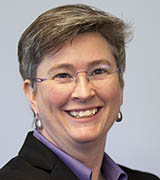News Briefs
New Director of NCATS: Joni L. Rutter, Ph.D.
Joni L. Rutter—who went from being Deputy Director of NIH’s National Center for Advancing Translational Sciences (NCATS) in 2019, to Acting NCATS Director in 2021, to being named the official Director in 2022—is excited to be leading NCATS into a future where more treatments will be delivered to all people more quickly.

CREDIT: NCATS
Joni L. Rutter
“Our programs are nimble and can pivot quickly to address public health emergencies,” she wrote in the online NCATS Director’s Corner on November 8, two days after she began her new role. “We are creative in how we leverage our resources to address high-level needs across all diseases. And because the needs far exceed the scope of any one organization, we employ team science to share ideas, knowledge, and expertise.”
Rutter is overseeing a diverse portfolio of research activities focused on improving the translational process of turning scientific discoveries into health interventions. The portfolio includes the Clinical and Translational Science Awards (CTSA) Program, which is one of NIH’s largest supported programs and has played an important role in the agency’s COVID-19 response. In addition, she is directing innovative research programs to advance diagnoses and treatments, including gene therapies, for some of the more than 10,000 known rare diseases. She will also lead labs at NIH that drive team science with both private and public partners to create and test innovative methods for improving, and speeding up, the drug-development process.
As the NCATS Acting Director, Rutter created and expanded strong networks across public and private sectors and has championed approaches for leveraging real-world data and artificial intelligence and machine learning to rapidly address public health questions. In the area of rare-disease research, she led an initiative that used data from health care systems to calculate approximate costs for the millions of people with rare diseases. This and related initiatives prompted recommendations, such as enhancing the collection of rare-disease patient data, to reduce the economic and medical burdens facing this community. She also created a multidisciplinary team that developed the National COVID Cohort Collaborative, a partnership among organizations to provide a national database of electronic health records. It is now one of the largest collections of secure and deidentified clinical data in the United States for COVID-19 research.
Rutter’s career at NIH began more than 20 years ago. After earning a Ph.D. in pharmacology and toxicology from Dartmouth Medical School (Hanover, New Hampshire) in 1999, she joined the National Cancer Institute as a postdoctoral fellow and studied gene-environment interactions in breast, ovarian, and melanoma cancers. From 2003 through 2016, she held various positions in the National Institute on Drug Abuse (NIDA) including as Director of the Division of Neuroscience and Behavior, where she oversaw and developed research portfolios in basic and clinical neuroscience. She also coordinated the NIDA Genetics Consortium and biospecimen repository.
In 2016, she established and became the Director of Scientific Programs for NIH’s All of Us Research Program, which aims to advance precision medicine by building a diverse database that can inform thousands of studies on a variety of health conditions. The program is focused on ensuring that the one million United States participants who enroll represent all communities and backgrounds. She spearheaded efforts to ensure that the program focused on diversity and inclusion from the outset so that the participant cohort places emphasis on groups that are underrepresented in biomedical research (PLos One 15:e0234962, 2020).
Rutter has continued efforts to reduce health disparities through translational science approaches and to enhance diversity, equity, inclusion, and accessibility among NCATS staff and the broader translational science workforce.
Rutter sees the NCATS community as strong and resilient. “That’s important because we face incredible health challenges,” she said. “We need team science and innovative approaches that can bring more treatments to people. Working across our collective biomedical ecosystem is critical for doing just that.”
This page was last updated on Sunday, January 8, 2023
